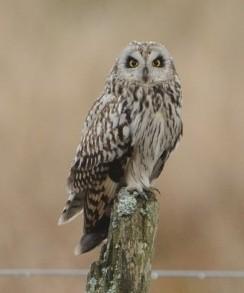
3 minute read
RSPB Pagham Nature
16 Nature
The state of our nature By Roy Newnham, Visitor Experience Officer, RSPB Pagham Harbour
Advertisement
Of 8,431 UK species assessed, one in seven is at risk of extinction. This frightening statistic is just one of the startling and alarming, facts to come out of the 2019 State of Nature Report released last month. The RSPB, Marine Conservation Society, World Wildlife Fund, Wildlife Trusts and Plant life are among over 70 wildlife organisations, plus government agencies that have joined forces to pool data and expertise, giving the clearest picture to date of the status of our species.
Since rigorous scientific monitoring began in the 1970s, there has been a 13% decline in average abundance across wildlife studied and the declines are continuing unabated. The main causes are well documented –changes in the way we manage our land for agriculture, climate change, urbanisation, pollution, how we manage our woodlands and freshwater, invasive non-native species and overfishing.
Similarly, the solutions, both at government level and what we can do as individuals, have been much discussed and I make no apologies for also suggesting becoming a member and, or volunteering for one or more of the many wildlife charities that contributed to the report. The underlying message is clear. We as a species, are affecting the environment around us to the detriment of the natural world, and only we can change this. To view the full report go to www.nbn.org.uk/stateofnature2019/reports.
This month sees the return of our winter wildfowl and waders. To think that in my short lifetime their winter soundtrack could be a thing of the past, as our coastline and countryside changes, is hard to bear. The constant honking and babbling of brent geese, accompanied by the whistling of wigeon and teal drifting across the saltmarsh lifts my spirits in the bleaker months. It can be overcast and foreboding, but that sound simply makes me smile and the stresses of modern life slip away. Others are arriving too… Wigeon - Andy Hay
Short-eared owls quarter low over the ground often at Owl Point and over the banks of Medmerry. Barrelshaped with a blunt face and fierce yellow rimmed eyes, they fly buoyant on long wings, often during the day. Finches and pipits gather in greater numbers in the farmland around Medmerry, attracting merlin. This is a small dynamic falcon flying fast and low over the ground in pursuit of its prey. The male is blue-grey above with a black band at the end of its tail while the larger female is brown with a barred tail. Medmerry is also a good place to scan the gorse bushes for Dartford warbler. Sporting a reddish-brown underside, a long tail and red eye, they often move from their inland heath sites to the coast in winter. Dartford warbler - Ben Andrew

On the beaches, small waders run up and down the strandline like children playing „catch me‟ with each wave that breaks on the shore. These are turnstones and as their name suggests, they flick and turn over the stones, seaweed and debris in search of the crustaceans and other invertebrates hidden amongst them. With a very dark brown head and back, a white belly and bright orange legs, they can be quite confiding and are a delight to watch as they scuttle to and from.

Of course when trying to identify birds and many other creatures, it helps to have a good pair of binoculars or a telescope to reveal the details. Many of our birds may also appear at first glance somewhat drab. However, if you were to get a close look you will discover that what was just plain brown feathers, is actually a delicate mottling of many shades and quite beautiful. That said, with so many different types of optics on the market it can be difficult to know where to start. With this in mind we have a Binocular and Telescope Open Day on Saturday 7th December at our Visitor Centre on the B2145 south of Chichester. Here you can try out a selection, get advice from our expert optics team and treat yourself or buy a Christmas present for a loved one. Short-eared owl - Ben Andrew
For more information on joining our team of volunteers, guided walks and all our other events, pop into our Visitor Centre on the B2145 south of Chichester, or visit our website www.rspb.org.uk/paghamharbour or call 01243 641508.
through the door











